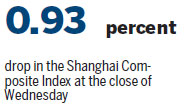Home spending 'key to mainland's growth'
Updated: 2015-10-15 07:32
By Oswald Chanin Hong Kong(HK Edition)
|
|||||||
More reforms urged to lift domestic consumption and meet GDP target
Domestic consumption will be key driver for the mainland's economic growth which is tipped to reach 7 percent this year, says Jing Ulrich, managing director and Asia Pacific vice-chairman at JPMorgan.
The US investment bank said fiscal policies will be more effective than monetary policies in stimulating economic growth, such as by encouraging provincial governments to conduct debt swaps and make infrastructure investments in the rural areas.
China's customer price index and producer price index fell to 1.6 percent and a negative 5.9 percent, respectively, for September, indicating the mainland's continuous subdued economic growth.
The mainland's foreign trade last month showed a mixed picture, with exports falling less than in August, but the decline in imports is accelerating. Exports fell by 3.7 percent year-on-year while imports plunged by 20.4 percent last month. A trade surplus of $60.3 billion for September was recorded as plunging imports outweighs the decline of exports.
"Net exports only marginally contribute to gross domestic product (GDP) growth. Investment in real estate and manufacturing is also losing steam in kick-starting economic growth," Ulrich said in address to the American Chamber of Commerce in Hong Kong on Wednesday.
"More mainland people will be willing to spend if the central government improves the social security net to provide retirement benefits and introduces financial reforms to foster more diversified investment products. The mainland should leverage its savings pool of $22 trillion to stimulate domestic consumption," she said.
Other prominent economists also share similar sentiments.

"The notably wide trade surplus in September is a sign of frail domestic demand rather than any major recovery in external demand," Bank of America Merrill Lynch Chief Economist Sylvia Sheng warned.
HSBC economist John Zhu said: "With external demand unlikely to rebound very strongly and the mainland economy to be driven by domestic sources, more decisive policies are needed in the coming months. We expect to see another 0.25-percent policy rate cut and cuts of 1.5 percent in banks' reserve requirement ratio in the last months of 2015."
The market focus will be on the release of the third quarter GDP figure on the coming Sunday and the draft of the 13th Five-Year Plan to be unveiled at the Fifth Plenary Session of the 18th Communist Party of China Central Committee meeting from Oct 26 to Oct 29.
"We expect the central government to introduce policies to maintain high quality economic growth, raise the proportion of services industry and high-technology in contributing to GDP growth, ensure financial reforms will be launched as scheduled and foster infrastructure investment," Ulrich added.
Turning to the recent stock market rally after the market rout in July and August, she forecast that the equity markets' performance on the mainland and in Hong Kong in the fourth quarter will be better than the second and the third quarter.
Louis Kuijs, ahead of Asia Economics at Oxford Economics, said, as part of deepened economic reform, the central government should further streamline the operations of State-owned enterprises (SOEs). "The mainland needs to reform SOEs governance and level the playing field between SOEs and other companies, raise SOE dividends and reform the intergovernmental fiscal system," he said.
Hong Kong's benchmark Hang Seng Index edged down 0.71 percent to close at 22,439 points on Wednesday. The Shanghai Composite Index retreated 0.93 percent.
oswald@chinadailyhk.com
(HK Edition 10/15/2015 page7)